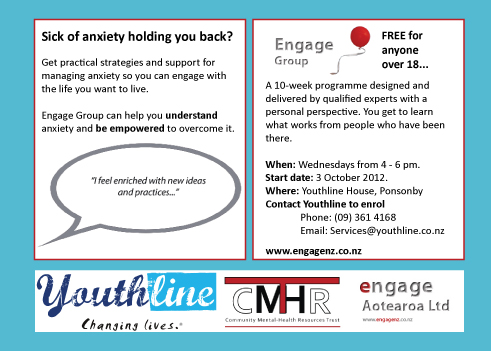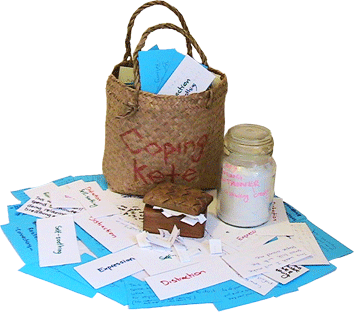Less than two weeks to go!
The Ministry of Justice has said that it will stop consulting with Community Law Centres by 1 August. That makes the next two weeks a really important time to explain to the Ministry exactly why we need direct specialist legal services.
Here’s what you can do to help:
Come to the “Save Disability Law” public meeting
- 1pm – 3pm on Monday 30th July 2012
- Western Springs Community Garden Hall, 956 Great North Road
RSVP by phone 09 257 5140 or email info@adl.org.nz
Venue is wheelchair accessible and NZ Sign Language interpreters have been booked. Please tell us if you have any other access or dietary requirements.
Please tell your whanau, friends and workmates to come along too.
Check out the media coverage
- Radio interview: http://www.planetaudio.org.nz/takeitfromus
- Mental Health Foundation – press release
- http://www.mentalhealth.org.nz/page/1206-media-releases-2012+mental-health-foundation-joins-the-campaign-to-save-auckland-disability-law
- CP Society website: www.cpsoc.org.nz
- Engage Aotearoa article on website: www.engagenz.co.nz/?p=2909
It’s not too late to sign the open letter to Justice Minister Judith Collins
How to sign:
Email your name to info@adl.org.nz and they will add you as an email signatory to our list. If your organisation has not yet signed, ask them to support ADL.
If you are signing on behalf of an organisation, please include your logo.
Post it to Auckland Disability Law, PO Box 43 201, Mangere, Auckland
Fax it back to ADL on 09 275 4693 or scan it and email to info@adl.org.nz
Finally, you can print it out and post it directly to Minister of Justice, Judith Collins http://www.beehive.govt.nz/minister/judith-collins
What else you can do
You can write your own letter to Minister of Justice Judith Collins or to the Minister for Disability Issues, Hon Tariana Turia.
Lobby your local MP, Councillor or Local Board
- You can lobby, write to or talk to your Local MP. Click link below for list of MPs http://www.parliament.nz/en-NZ/MPP/MPs/MPs/
- Click here to find your local board (Auckland Council): http://www.aucklandcouncil.govt.nz/EN/AboutCouncil/representativesbodies/LocalBoards/Pages/Findyourwardandlocalboard.aspx
- Let ADL know how your communications with them were received.
Write to the newspapers, or put out your own press release
Contact ADL for further information
Follow on Facebook
Search and click the ‘like’ button on the Auckland Disability Law Facebook page
Huge thanks to the more than one hundred individuals and all these groups and organisations that have signed so far:
- Altus Enterprises
- Auckland Action Against Poverty
- Auckland Branch of the Association of Blind Citizens of New Zealand
- Auckland Disability Providers network
- CCS Disability Action
- Chair, Homeworks Trust
- Citizens Against Privatisation
- Community Law Canterbury
- DPA Dunedin
- DSAG Disability Strategic Advisory Group – Auckland Council
- Employment Dispute Solutions
- Engage Aotearoa
- Green Party of New Zealand
- Justice Action Group
- Kaitaia Community House
- Mana Tangata Turi O Aotearoa
- Mangere Community Law Centre
- National Secretary behal of New Zealand Public Serrvices Association
- Niu Ola Trust
- People First
- PHAB Pasifika
- PSA Deaf and Disabled Members
- Pukenga Consultancy
- Rotorua District Community Law Centre
- Service and Food Workers Union
- Socialist Aotearoa
- Tamaki Ngati Kapo inc
- Taranaki Community Law
- Te Roopu Waiora Trust
- The Asian Network Inc.
- The Auckland Deaf Christian Fellowship
- Unite Union
- Youthlaw
Previous media coverage:
- Herald article www.nzherald.co.nz/nz/news/article.cfm?c_id=1&objectid=10817730
- Nicola being interviewed on Checkpoint last week: http://www.radionz.co.nz/national/programmes/checkpoint/audio/2524294/auckland-disability-law-fights-against-closure
Further Information
If you require any further information or you are able to help the campaign in any way, please contact us:
Nicola Owen
Development Manager
Auckland Disability Law
- Phone 09 257 5140
- Fax 09 275 4693
- Mobile 0274575140
- email info@adl.org.nz
- www.aucklanddisabilitylaw.org.nz








